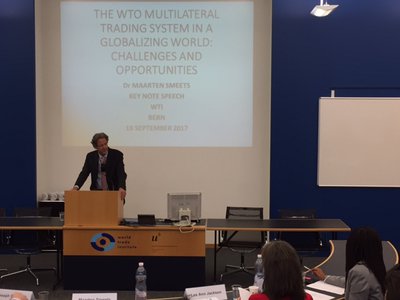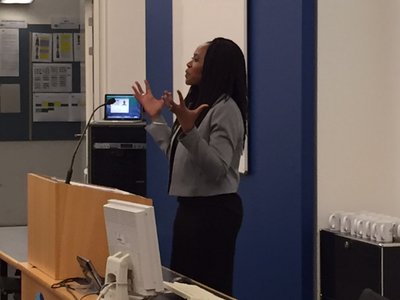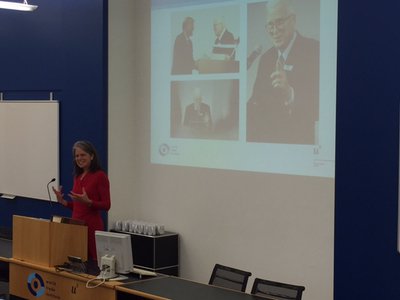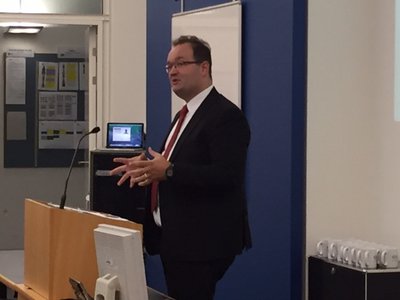20 Sep 2017
2017-18 graduate study programmes open
On 18 September the WTI held a ceremony to officially launch the 2017-2018 graduate studies programme and welcome new students to the institute.
The event began with an introduction by Professor Joseph Francois who extended a welcome to those taking part in the newly expanded studies programme. He commented that these are interesting times to be studying international trade in the context of Brexit and the shift in US trade policy.
The keynote speech on ‘The WTO Multilateral Trading System in a Globalising World: Challenges and Opportunities’, was given by Dr Maarten Smeets, Head of Technical Assistance Coordination at the Partnerships and Internship Programmes Section, Institute for Training and Technical Co-operation (ITTC) at the WTO, and Senior Visiting Fellow at the Clingendael Institute, The Hague.
Dr Smeets began by saying the WTO multilateral trading system presents many challenges and opportunities. There is a misconception that globalisation is taking away jobs and a new trend towards protecting markets. However, protectionism will lead to a weakening of global trade and runs counter to the liberalisation of trade that the WTO stands for. “Protecting markets is not part of the solution but part of the problem, and needs to be stopped,” he said.
In the global village that the world has become the WTO has an important role to play in ensuring a stable multilateral trading system. There needs to be more policy coherence and a broadening of the trade rules to deal with the challenges of the 21st century as the rules are “way behind the reality”, in Dr Smeets’ view. At the same time there is a need to ensure that trade liberalisation leads to gains for all.
Moving the boat forward
The WTO official, an enthusiastic rower, made an analogy with rowing. The WTO has expanded rapidly, and now comprises 164 members, including developing countries. “The larger the boat the more complicated it gets. You need to create stability but also move the boat forward,” he said. This involves a great deal of preparatory work, fiscal fitness, collective and individual responsibility.
“Heavyweights and lightweights can row together,” Dr Smeets added, as long as they can balance their skills, be flexible and adjust to one other. “If one rows hard it destabilises the boat.” The team needs to be clear about its priorities, but there is also a role for a leader, or cox. “In the WTO we don’t really have a cox. But this is indispensable the bigger the boat gets,” he warned. For the WTO process this means having a common understanding and vision of what is wanted. There is a need to think about who takes on the leadership role and what is expected of the leader.
The question of whether the WTO, founded in 1995, is still “fit for purpose” also needs to be answered, the speaker said. Globalisation has created a new economic context where trade is more dynamic than ever before and trade in goods and services is becoming increasingly inseparable. The landscape is shifting rapidly with Asia, especially China, becoming an important player. The WTO needs to reflect the new realities in its negotiations and policies.
Ahead of the 11th WTO Ministerial Conference in Buenos Aires in December, Dr Smeets highlighted the importance of having a roadmap for the future. He concluded by saying that the multilateral trading system needs to be strengthened further and protectionism should be resisted.
Student internships
Dr Lee Ann Jackson of the WTO Agricultural and Commodities Division then made a presentation on the John H. Jackson Internship Fund (JJIF), named after her late father, an eminent professor of law and friend of the WTI.
She recalled that her father had developed ideas about dispute resolution and had stressed the need to promote fairness by moving away from a trading system relying on power to one based on rules. In 1990 he put forward the idea of a world trade organisation.
Dr Jackson said the internship fund was aimed at building community and encouraging students to do interdisciplinary work. “I would encourage you to think about how your training and knowledge can be applied to real-world problems,” she told the students.
Koen Berden, Director of Outreach at the WTI, next took the floor to inform the students about a range of internship options, including at the WTI.
Living the dream
A graduate of the MILE programme, Kholofelo Kugler, then talked about how she arrived in Switzerland four years ago to fulfil her dream of studying at the WTI and becoming a trade lawyer. She spoke about how challenging the course had been but added that without the MILE her life would have been quite different and “I would not be living my dream”.
The alumnus, who is now Counsel at the Advisory Centre on WTO Law (ACWL) in Geneva, stressed how well regarded the MILE is, and how many of her colleagues at the ACWL are also WTI alumni. It was a pleasure to be part of the “MILE mafia” and to have mentored three students, she said. She passed on advice to the new intake, including that they should not skip class, should get to know the lecturers and make friends with their fellow students, and ask for help if they were struggling. But they should also have fun, travel, and enjoy their time.
The event ended with a presentation of business cards to the students followed by a drinks reception.
Further info
Photo Album on Flickr





